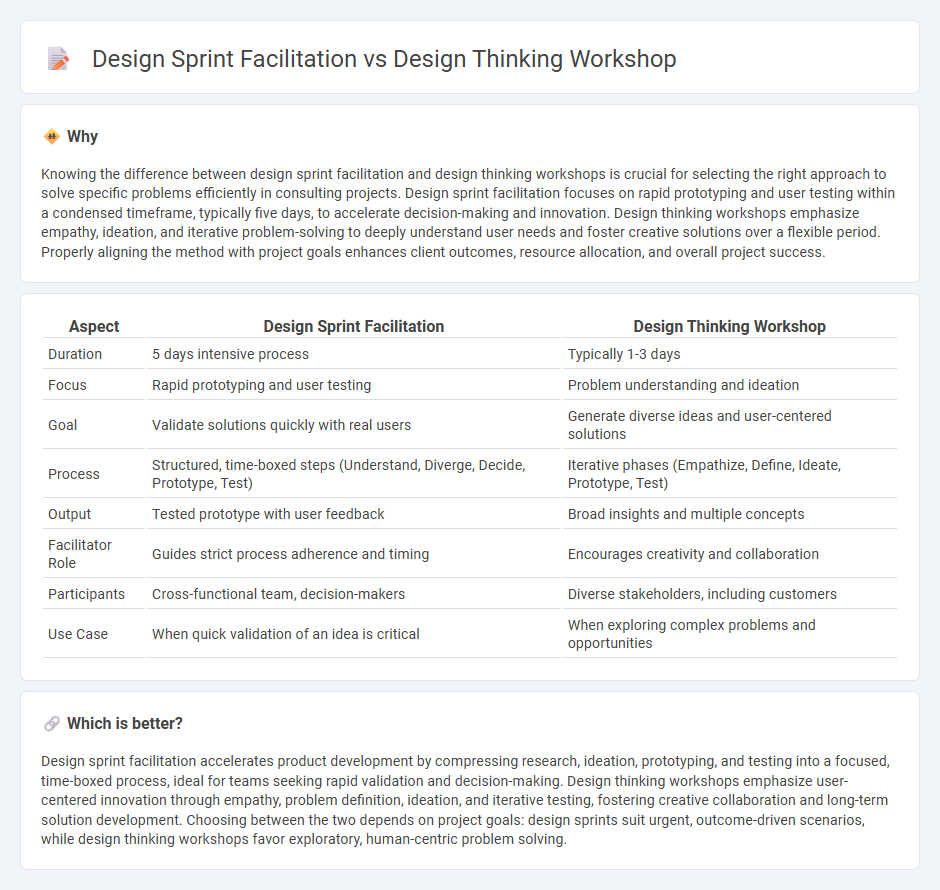
Design sprint facilitation accelerates product development by condensing ideation, prototyping, and testing into a five-day process, enhancing rapid decision-making and reducing time-to-market. Design thinking workshops focus on human-centered problem solving through empathy, ideation, and iteration, fostering creativity and innovative solutions across diverse teams. Explore how choosing between a design sprint and design thinking workshop can transform your project outcomes effectively.
Why it is important
Knowing the difference between design sprint facilitation and design thinking workshops is crucial for selecting the right approach to solve specific problems efficiently in consulting projects. Design sprint facilitation focuses on rapid prototyping and user testing within a condensed timeframe, typically five days, to accelerate decision-making and innovation. Design thinking workshops emphasize empathy, ideation, and iterative problem-solving to deeply understand user needs and foster creative solutions over a flexible period. Properly aligning the method with project goals enhances client outcomes, resource allocation, and overall project success.
Comparison Table
| Aspect | Design Sprint Facilitation | Design Thinking Workshop |
|---|---|---|
| Duration | 5 days intensive process | Typically 1-3 days |
| Focus | Rapid prototyping and user testing | Problem understanding and ideation |
| Goal | Validate solutions quickly with real users | Generate diverse ideas and user-centered solutions |
| Process | Structured, time-boxed steps (Understand, Diverge, Decide, Prototype, Test) | Iterative phases (Empathize, Define, Ideate, Prototype, Test) |
| Output | Tested prototype with user feedback | Broad insights and multiple concepts |
| Facilitator Role | Guides strict process adherence and timing | Encourages creativity and collaboration |
| Participants | Cross-functional team, decision-makers | Diverse stakeholders, including customers |
| Use Case | When quick validation of an idea is critical | When exploring complex problems and opportunities |
Which is better?
Design sprint facilitation accelerates product development by compressing research, ideation, prototyping, and testing into a focused, time-boxed process, ideal for teams seeking rapid validation and decision-making. Design thinking workshops emphasize user-centered innovation through empathy, problem definition, ideation, and iterative testing, fostering creative collaboration and long-term solution development. Choosing between the two depends on project goals: design sprints suit urgent, outcome-driven scenarios, while design thinking workshops favor exploratory, human-centric problem solving.
Connection
Design sprint facilitation and Design thinking workshops are connected through their shared focus on human-centered problem solving and rapid innovation cycles. Both methodologies emphasize collaborative ideation, prototyping, and user feedback to accelerate solution development within compressed timeframes. Integrating design sprints within design thinking workshops enhances structured experimentation and decision-making, driving actionable insights and validated results for consulting projects.
Key Terms
Empathy Mapping
Empathy Mapping in design thinking workshops centers on deeply understanding user emotions, needs, and pain points through collaborative exploration, fostering a user-centric mindset over extended sessions. In design sprint facilitation, Empathy Mapping is a fast-paced activity that quickly captures key insights to align the team before prototyping, emphasizing rapid decision-making within a condensed timeline. Explore more to discover how each approach uniquely harnesses empathy for innovative problem-solving.
Rapid Prototyping
Design thinking workshops emphasize empathy and iterative problem-solving, guiding teams through ideation to develop user-centered solutions. Design sprint facilitation accelerates this process by condensing research, prototyping, and testing into a focused 5-day cycle, prioritizing rapid prototyping to validate ideas quickly. Explore how tailored facilitation techniques enhance outcomes by visiting our detailed guide on design thinking and sprint methodologies.
Time-boxed Activities
Design thinking workshops typically span multiple days, encouraging deep exploration and iterative problem-solving through flexible, user-centered activities. Design sprint facilitation condenses the innovation process into a strict five-day time-box, ensuring rapid prototype development and immediate user feedback. Explore how these time-boxed methodologies can accelerate creativity and decision-making in your projects.
Source and External Links
How To Run a Design Thinking Workshop [2024 Guide] - Outlines a step-by-step process for running a collaborative, human-centric workshop focused on the five phases of Design Thinking (Empathize, Define, Ideate, Prototype, Test) to solve business challenges, with flexible duration and format options for teams of any size.
How To Run An Awesome Design Thinking Workshop [2025] - Provides a clear checklist for planning and conducting a Design Thinking workshop, emphasizing setting objectives, framing the challenge as a "how might we" question, and guiding cross-functional teams through ideation and solution development.
Design Thinking Workshop - Professional and Continuing Studies - Offers a two-day, hands-on training covering the Design Thinking framework, mindsets, tools, and templates, with practice on real-life challenges for professionals seeking to apply human-centered innovation in their organizations.
 dowidth.com
dowidth.com